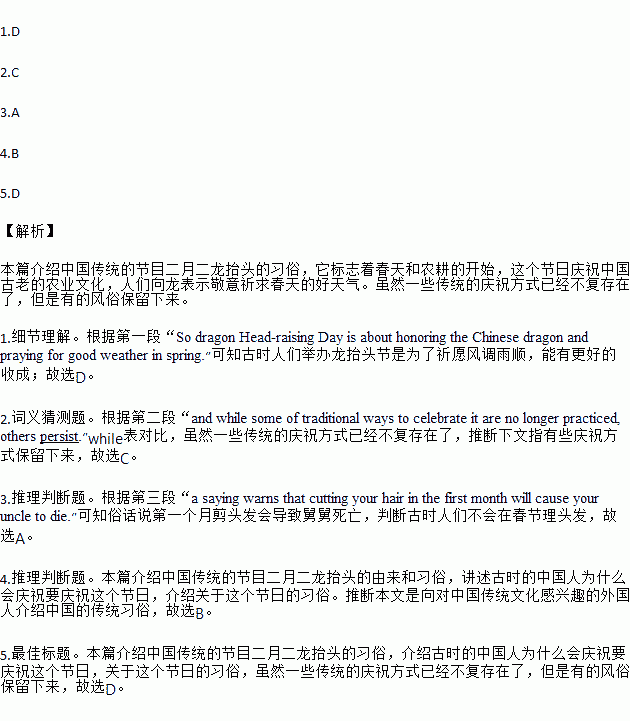题目内容
Chinese Dragon Head-raising Day is a traditional Chinese festival held on the second day of the second month of the Chinese calendar. It marks the start of spring and farming. Ancient people believed that after this day, rainfall increases because the rain- bringing Dragon King has woken up from his winter sleep. In ancient times, farming highly depended on the weather. Proper rainfall and plenty of sunlight were necessary for a good harvest (收成) at the end of the year. The Chinese dragon, besides a symbol of good luck and great power, is also the god managing weather and water. So dragon Head-raising Day is about honoring the Chinese dragon and praying for (祈祷) good weather in spring.
The festival celebrates ancient agrarian (农耕的) Chinese culture, and while some of traditional ways to celebrate it are no longer practiced, others persist.
The most famous tradition is getting a haircut. a saying warns that cutting your hair in the first month will cause your uncle to die. Although today few pay attention to it, it was once tradition for people to line up outside barber shops this day after they avoided haircuts for the preceding month.
Today, Chinese Dragon Head-raising Day is celebrated in many different ways, most of which are still similar to those practiced in the ancient times, including eating spring pancakes and noodles. People eat tofu balls in East China’s Fujian Province during the festival while fried beans are the traditional festival food for people in parts of Shandong Province. Food eaten on this day also gets a lucky name. For example, noodles are “dragon’s beard (胡须)” and dumplings are “dragon’s ears”.
1.In fact ancient Chinese held Dragon Head-raising Day ________.
A.to get as much rain as possible B.to celebrate the Dragon King’s birthday
C.to wake up the sleeping dragon King D.to wish for good weather for better farming
2.The underlined word “persist” probably means ________ in this passage.
A.消亡 B.改变 C.持续 D.完善
3.From the passage we can know that ancient Chinese ________ on the Spring Festival.
A.might not have their hair cut B.might avoid meeting their uncles
C.might line up outside the barber shops D.might help their uncles get a haircut
4.This passage was most probably written for .
A.foreigners learning about agrarian culture
B.foreigners interested in Chinese traditional culture
C.Chinese farmers in need of good weather conditions
D.Chinese students proud of the long history of our country
5.What’s the best title of this passage?
A.The history of Dragon Head-raising Day B.The development of Dragon Head-raising Day
C.The celebration of Dragon Head-raising Day D.The introduction of Dragon Head-raising Day

